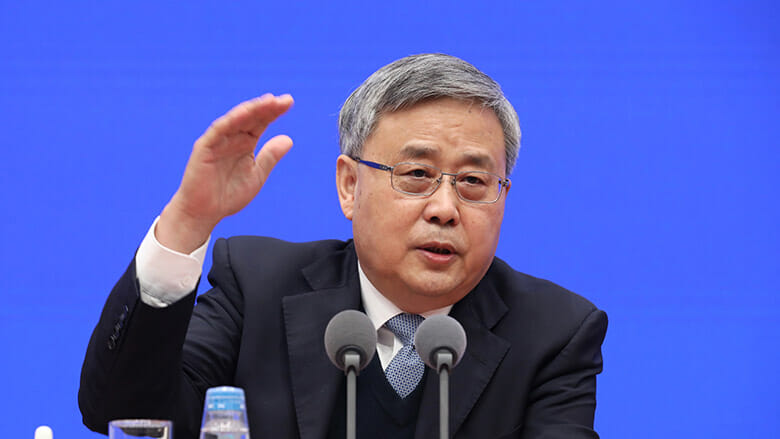
CBIRC chairman Guo Shuqing may think China’s developers are in over their heads (Source: Getty Images)
In today’s roundup of regional news headlines, Chinese developers get a boost on reports that regulators are urging lenders to support the country’s beleaguered property sector, while Hong Kong’s housing market flashes weakness as nearly a quarter of available flats go unsold at a Tseung Kwan O project.
China Steps Up Loan Support to Developers Amid Mortgage Boycott
Chinese regulators have stepped up efforts to encourage lenders to extend loans to qualified real estate projects as the beleaguered property sector faces fresh risks from a widening mortgage-payment boycott on unfinished houses.
The China Banking and Insurance Regulatory Commission told the official industry newspaper on Sunday that banks should meet developers’ financing needs where reasonable. Read more>>
China Developers Rise as Banks Urged to Tackle Mortgage Crisis
Shares of Chinese developers jumped by the most in nearly a month after a report that the nation’s banking regulator urged lenders to support the sector amid a growing mortgage boycott.
A gauge of Chinese real estate firms gained as much as 3.6 percent on Monday, on track to snap a five-day decline. Top performers included KWG Group Holdings and Seazen Group, both up more than 10 percent in Hong Kong. The city’s benchmark Hang Seng Index gained as much as 2.7 percent, led by property shares. Read more>>
China Mortgage Boycott Data Erased by Censors as Crisis Spreads
China is censoring crowd-sourced documents tallying the number of mortgage boycotts spreading across the country, potentially hampering a key source of data for global investors and researchers tracking the property crisis.
Shared files managed on platforms including China’s Quora-equivalent Zhihu and on sites such as Kdocs and Wolai have been banned after reports that the number of homebuyers refusing to pay mortgages surged in a span of days. GitHub, a popular file-sharing site for coders, remains as a source for people to post documents. Read more>>
Genting Singapore Says Unsolicited Offer Hasn’t Been Pursued
Genting Singapore, one of the city-state’s two casino operators, said it was informed that controlling shareholder Genting Bhd had received an unsolicited approach for its holding in the company and that the offer has not been pursued.
Executive chairman Lim Kok Thay, who holds the same position in Genting Bhd, confirmed the approach, Genting Singapore said in a Sunday stock filing. Read more>>
Just 77% of Flats at Tseung Kwan O Project Sold Amid Property Slowdown
Hong Kong’s housing market is under greater pressure as home sales slow amid concerns of rising interest rates, softening home prices and greater supply in the pipeline.
Just 128 out of 168 flats, or 76.8 percent, offered at Villa Garda’s phase two — developed by Sino Land, K Wah International and China Merchants Land — at Lohas Park in Tseung Kwan O were sold on Sunday, according to agents. Read more>>
Singapore’s Metro Books S$36.3M Impairment on China Investments
The ongoing credit situation in China’s property sector contributed to the S$36.3 million ($26 million) in impairment losses taken in Metro Holdings’ financial year ended 31 March 2022, the property group said Sunday.
The impairment losses were on the amounts due from associates; namely, Jovial Paradise and Global Charms, both of which had invested in real estate debt instruments in China. Metro’s commitment was S$48.7 million for Jovial Paradise and S$67.7 million for Global Charm. Read more>>
Singapore Marks 20 Years of REITs, Property Trusts
This year marks the 20th anniversary of Singapore REITs and the property trust sector, with the first REIT — CapitaLand Mall Trust — having listed in July 2002, followed by Ascendas REIT in November 2002.
Since then, the sector has evolved into the largest REIT market in Asia ex Japan, with a mature ecosystem. As of last month, Singapore listed 43 S-REITs with a total market value exceeding S$110 billion ($78.8 billion) and an average dividend yield of 6.4 percent. Read more>>
Global Investors Avoid China as Xi Policies Backfire
After drawing foreign capital into China’s markets for years, President Xi Jinping is now facing the risk of a nasty period of financial de-globalisation. Investors point to one main reason why: Xi’s own policies.
Money managers once enticed by China’s juicy yields and huge tech companies now say that the reasons to avoid the country outweigh incentives to buy. They cite everything from unpredictable regulatory campaigns to economic damage caused by strict COVID-19 policies, not to mention growing risks stemming from a wobbly real estate market and even Xi’s coziness with Russia’s Vladimir Putin. Read more>>
Tune in again soon for more real estate news and be sure to follow @Mingtiandi on Twitter, or bookmark Mingtiandi’s LinkedIn page for headlines as they happen.
Leave a Reply